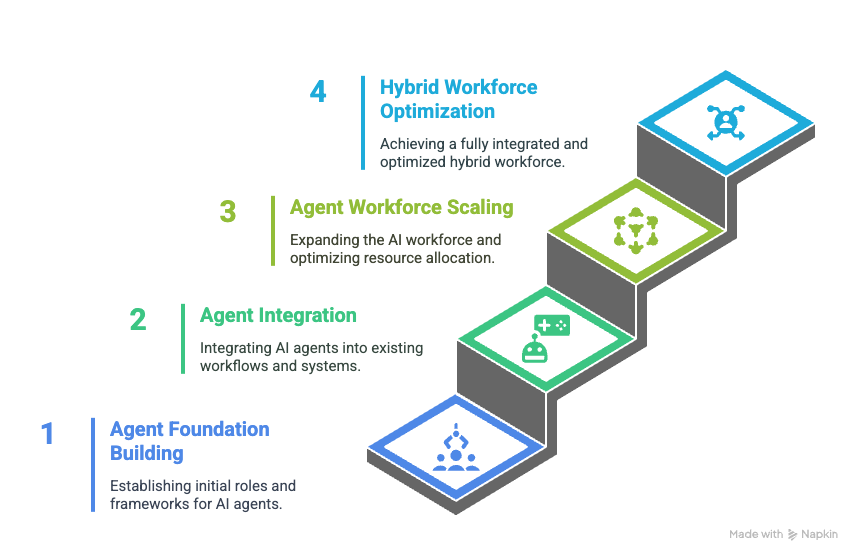How might we create a new hybrid workforce of human + AI agents?
This exercise looks at evolving Human + AI collaboration tasks. This includes new roles, their responsibilities and their impact over a maturity timeline.
Stage 1: Agent Foundation Building (0-6 months)
Roles to Add - Primary Responsibilities - Organizational Impact
AI Product Manager - Identify initial agent use cases, define agent roles - Ensures agent initiatives align with business objectives
Data Engineer - Establish secure data access for agents, ensure data quality - Creates the foundation for all agent initiatives
AI Risk & Governance Expert - Establish agent governance frameworks, security protocols - Prevents costly governance issues and builds trust
Digital Workforce Manager - Set up agent registration, deploy initial agents - Establishes digital workforce management practices
Readiness Signals for Stage 2:
Multiple task-based agents successfully deployed and registered
Secure data access frameworks functioning reliably
Clear business value demonstrated in at least 2-3 agent use cases
Executive leadership showing increased interest in digital workforce
Initial agent governance framework documented and implemented
Increasing demand for integration between agents and human workflows
Stage 2: Agent Integration (6-12 months)
Roles to Add - Primary Responsibilities - Organizational Impact
AI Architect - Design scalable agent systems, establish technical standards - Enables consistent implementation across departments
Human-AI Workflow Architect - Create integrated workflows for humans and agents - Builds effective handoffs between humans and digital workers
Model Validator - Establish testing protocols for agents, validate performance - Ensures reliability and builds organizational trust
AI Change Ambassador - Drive adoption of agents across departments -Addresses resistance and showcases value
Readiness Signals for Stage 3:
At least 3-5 role-based agents (not just task-based) deployed
Growing backlog of agent use cases from multiple business units
Established protocols for human-agent collaboration
Adoption metrics showing consistent engagement with agents
Initial ROI metrics demonstrating positive financial impact
Growing need for cost optimization across the digital workforce
Cross-functional teams collaborating effectively with agents
Stage 3: Agent Workforce Scaling (12-24 months)
Roles to Add - Primary Responsibilities - Organizational Impact
Chief Cognitive Officer - Coordinate enterprise AI strategy, harmonize human and digital capabilities - Elevates digital workforce to strategic priority
Digital Labor Economist - Calculate ROI, optimize resource allocation between humans and agents - Enables cost-effective scaling of digital workforce
AI Implementation Specialist - Standardize agent deployment processes - Accelerates time-to-value for agent initiatives
Continuous Skills Harmonizer - Align human upskilling with agent capability development - Creates complementary development paths
AI Performance Analyst - Measure business outcomes, optimize agent performance - Connects agent initiatives to business value
Readiness Signals for Stage 4:
Digital workforce generating significant business value (>10x cost)
Agent inventory growing complex enough to require dedicated management
Multiple business units depending on agents for core processes
Organizational culture showing acceptance of agents as "digital colleagues"
Standardized processes established for agent lifecycle management
Need for deeper integration of human and digital workforces
Cultural challenges emerging around human-agent collaboration
Stage 4: Hybrid Workforce Optimization (24+ months)
Roles to Add - Primary Responsibilities - Organizational Impact
AI Workforce Governance Officer - Address regulatory compliance for digital workforce - Ensures responsible agent use as impact grows
Hybrid Culture Director - Develop cultural norms for human + agent collaboration - Creates effective hybrid team environments
Agent Behavior Analyst - Monitor for emergent behaviors, audit decision patterns - Ensures ongoing trust and ethical operation
Human-AI Collaboration Coach - Train humans to work effectively with agent colleagues - Maximizes value from human-AI partnership
AI Ethics Expert - Address complex ethical considerations - Ensures agents operate within ethical boundaries
Final Maturity Indicators:
Agent workforce embedded in most critical business processes
Clear competitive advantage derived from human-agent collaboration
Organizational culture embraces agents as digital colleagues
Sophisticated governance frameworks operating effectively
Innovation pipeline consistently identifying new agent opportunities
External recognition as a leader in human-agent workforce management
Measurable business transformation enabled by hybrid workforce
Sean Wood is the founder of Human Pilots AI — helping Executive Leaders successfully implement AI into their organizations.



